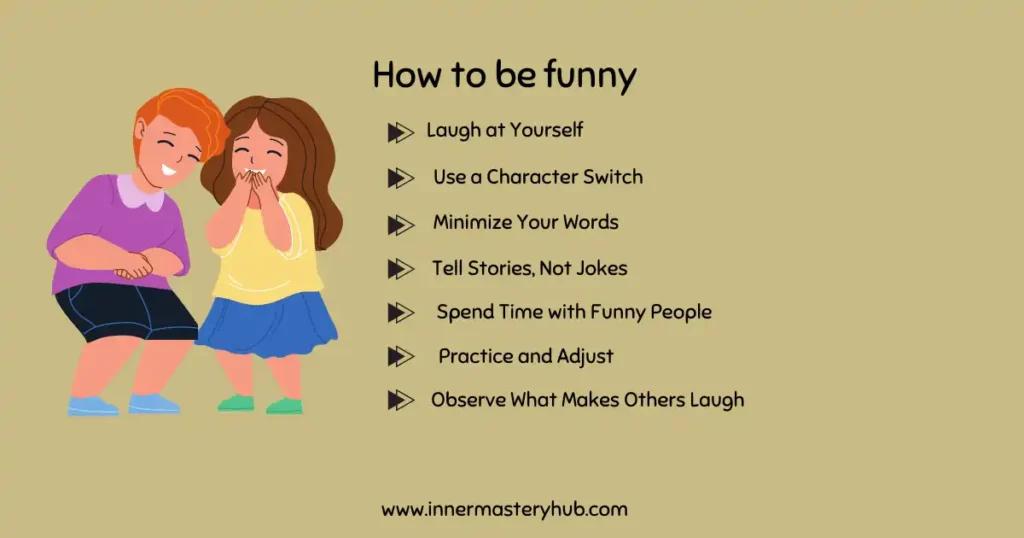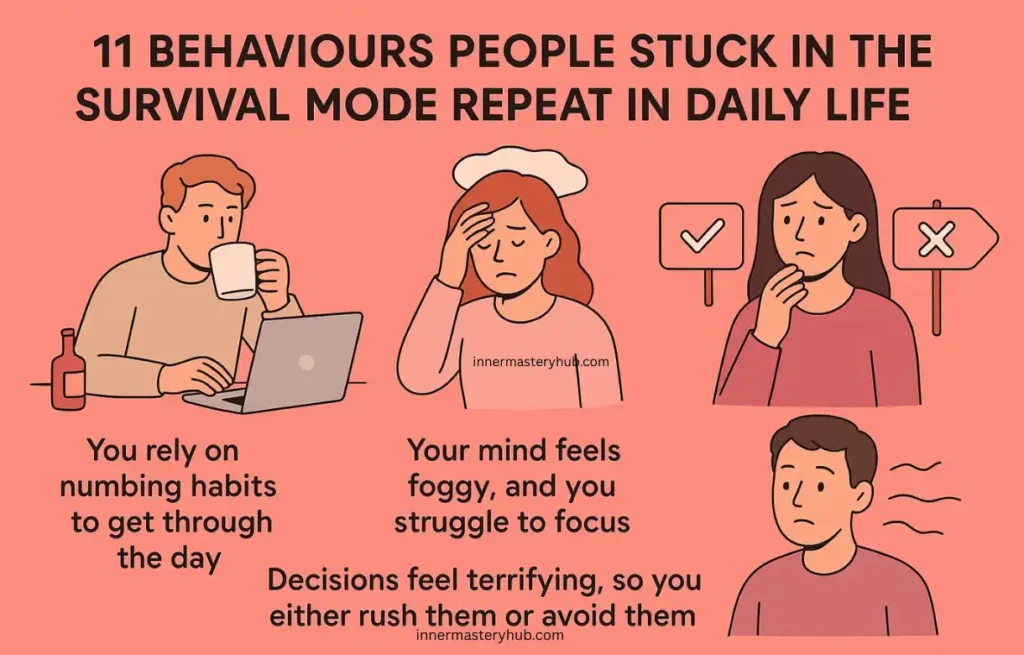How to Be Funny in Conversations — Without Trying Too Hard

Have you ever wondered “how to be funny” and effortlessly make people laugh? Well, you’re in the right place! I’ve always admired those with a great sense of humour, and through trial and error, I’ve discovered some fantastic strategies to improve it.
Humour isn’t just about telling good jokes; it’s about timing, delivery, and knowing your audience. Pay attention to the atmosphere and know when to speak up; you can easily integrate humour into your conversations and make everyone feel more at ease.
Some people are naturally funny; they can crack up on jokes easily, but that does not mean you can not improve your sense of humour. Being funny is a skill that can be developed by practice.
So, let me share with you these 8-step strategies that have helped me to find funny ideas and will undoubtedly improve your sense of humour, too. Ready to bring more laughter into your life?
Characteristics of a Funny Person
These characteristics are some of the traits of having a good sense of humour
– Quick wit and sharp timing
– Self-deprecating humour
– Ability to read the room
– Clever use of wordplay
– Great storyteller
– Observant of everyday absurdities
– Playful and lighthearted
– Confidence without arrogance
– Knows when to pause for effect
– Makes others feel at ease
8 Simple Ways to Be Funny
The secret to “how to be funny” in conversation is all about choosing your moment, reading the room, and finding a healthy balance between listening and speaking.
For instance, during a family dinner, I once cracked a joke about our pet dog just after a tense discussion, instantly lightening the mood. Similarly, at a work meeting, I noticed everyone was stressed about deadlines. I waited until there was a brief lull and then shared a funny story about a past project mishap, which had everyone laughing and eased the tension.
1. Laugh at Yourself
Try to be funny by not taking yourself too seriously. Laugh at yourself. Some of the heartbreaking moments you have had are, on the other hand, very rich material for your humour. Personal tragedy stories tend to make people laugh. These humorous stories enable you and your audience to laugh at your shared experiences.
For instance, I once splattered coffee all over me just before a significant work presentation. Rather than panicking, I made a joke that made everyone laugh and relieved the tension: I needed the caffeine inside of me more than on my clothes. At a different event, I stumbled and fell flat on my face while at a gathering.
After getting up and cleaning myself up, I joked that I was merely attempting to start a conversation. Sharing these anecdotes not only helps to lighten the mood but also increases your approachability and relatability.

2. Use a Character Switch
When telling a story, you often have multiple characters with distinct personas that people make natural assumptions about. Typically, these characters fall into expected roles, like Little Red Riding Hood being the innocent one and the Big Bad Wolf being the menacing one.
But imagine flipping those roles—what if the Big Bad Wolf suddenly became the vulnerable character? This reversal of expectations can make your story far more interesting and humorous. verturning assumptions and giving characters unexpected traits, you add a surprising twist that captures your audience’s attention and keeps them laughing.
3. Serve What Makes Others Laugh
Being observant is crucial if you want to learn something funny. Watch what makes people laugh and take note of it. Understanding what others find amusing will enhance your sense of humour.
Please don’t assume you know what will amuse your audience, as you may inadvertently upset them. But that shouldn’t stop you from trying out new kinds of jokes. Sometimes, when you’re feeling brave, try telling some jokes that are purposefully offensive.
Despite—or perhaps because of—their ridiculousness, many jokes can be so ridiculous that they end up being funny. People are often forced to laugh, even if they know they shouldn’t, because of the paradox they create. For example, “Why do gates surround cemeteries?
because individuals are clamouring to enter!” Playing on the unexpected, this kind of humour can be delightful.
4. Minimise Your Words
Keep it brief. C medians know that the quicker they get to the punchline, the better. Focus on the essential part of your story and convey it clearly and concisely.
Eliminate any unnecessary details. This approach ensures your humour hits harder and resonates more with your audience. B evity not only maintains engagement but also amplifies the impact of your jokes. S , streamline your narrative and watch your humour improve.
5. T ll Stories, Not Jokes
Instead of relying on jokes, which are essentially fabricated tales leading to a punchline, focus on telling relevant stories infused with humour. I the punchline of a joke fails, it can leave you feeling awkward.
However, when you share a story that contains the funniest elements, it serves a dual purpose. E en if the humour doesn’t land, the story itself remains engaging and meaningful. I it does make people laugh, that’s a bonus. This approach ensures that your narrative is always worthwhile, whether or not it elicits laughs.
6. Spend Time with Funny People
One of the best ways to enhance your sense of humour is to surround yourself with people who are funny. Being around those who naturally make others laugh can help you pick up on their timing, delivery, and perspective.
Watch funny TV shows. Observe how many comedians transform ordinary situations into something hilarious and how they adapt their responses to different audiences. Their influence can inspire you and provide you with new ideas and techniques. Please, laughter is contagious; spending time with funny individuals can make your own life more joyful and filled with humour.
7. Sh re stories, not jokes
A fantastic “tip for being funny” is to share stories instead of just jokes. Narratives can captivate an audience and facilitate the emergence of humour from relatable or surprising situations. Stories have several ways to make people laugh, which makes them adaptable and fun for all parties involved, unlike jokes that can fall flat if the punchline fails.
Storytelling, whether it be a personal account or a humorous anecdote, adds context and nuance to the comedic effect, making it a dependable strategy for fostering connection and laughter in social situations.
8. Practice and Adjust
To improve your humorous abilities, try out several approaches and styles to see which ones best suit the persona and target audience. Whether it’s wordplay, satire, physical comedy, or observational humour, experimenting with diverse techniques helps you hone your humorous timing and delivery.
You’ll gradually develop your distinct comedy style by combining aspects that work for you and seem genuine. Accept that you are growing, be receptive to criticism, and adjust your approach according to what makes people laugh and participate the most. You’ll undoubtedly discover your distinctive comedy style that makes your audience laugh and want more with perseverance and experimentation.
How to be Funny in Conversation?
One of the best ways to spice up a discussion and establish a connection with others is to be hilarious. The following advice will help you get started:
Recognise your audience. So, something entertaining to one person may offend another. Adapt your sense of humour to the person you are speaking with. Light hearted jokes about mutual experiences or insider information will go over better than dark ones.
Keep an eye out. Ke p an eye out for funny thoughts or observations, and draw comic relief from them. A humorous remark, an odd coincidence, or even a small accident might be elevated to an amusing moment.
The delivery is fundamental. When poorly told, even a fantastic joke can come across as unintelligent. Wo k on your accent and timing. See how stand-up comics and humorous films employ delivery to their advantage.
Accept a variety of humour genres. Hu our is more than merely cracking jokes. Tr witty remarks (smart remarks), observational humour (seeing the humour in ordinary settings), or self-deprecating humour (laughing at yourself).
Have faith in yourself. Having confidence in your joke might make it sound funnier even if it fails. Sp ak, look someone in the eye, and smile, being humorous in everyday situations. If you appear to be enjoying yourself, people are more inclined to chuckle.
The more you try to be hilarious, the better you’ll get at it—practice makes perfect. Try different things and discover what works without fear.
FAQs about how to be funny?
How can you become funny over text?
To convey humour over text, use clever wordplay, emojis to adjust tone, and make witty observations. Ke p messages concise and avoid overexplaining jokes. Ti ing matters—respond promptly to maintain momentum. Incorporate memes or GIFs for humour. Experiment with different styles until you find what clicks with your audience.
How to be funny and attractive?
To be funny and attractive, show confidence in humour without overshadowing others. We want to connect and uplift, not offend. Listen actively, respond playfully, and be genuine. Balance humour with empathy and kindness. Sty attuned to social cues and adapts humour to suit different situations and audiences.
How to be funny with friends?
To be funny with friends, relax and be yourself. Use amusing anecdotes, inside jokes, and playful banter to engage your audience. Listen attentively and respond with witty remarks. Em race spontaneity and laugh together. Respect boundaries and ensure humour fosters a positive, inclusive atmosphere among friends.
How to be funny at work?
To be funny at work, use appropriate humour that aligns with the workplace culture. Improve your humour by incorporating it into discussions, but avoid sensitive topics. Share light-hearted stories, clever observations, and supportive jokes. Respect colleagues’ boundaries and ensure humour enhances morale and team cohesion.
How to be funny in conversation?
How to be funny if you’re shy?
Use your natural voice and comfort zone: start with self-aware or gentle humour about your own experience, rather than high-risk jokes. Laughing openly and being relaxed invites others to join in the laughter. With practice, your confidence (and funniness) will grow.
How to be funny without telling jokes?
You don’t have to rely on classic jokes: share funny observations, use timing, play with contrast (what’s expected vs what happens), and use mild exaggeration. Surprise and context often make everyday remarks humorous.
How to be funnier when telling stories?
Highlight surprise, build expectation, then twist. Use vivid details, pace your delivery (pause before the punchline), and select memorable small moments. Your natural quirks or reactions often become the funniest part.
How to find your own humour style (how to be funny your way)?
Explore what makes you laugh, watch different styles, note your strengths (dry, witty, silly, observational). Then lean into what feels natural. Authenticity often beats forced jokes. Practice and refine reflectively.
How to handle if a joke fails when you try how to be funny?
It happens! Smile, move on gracefully, maybe acknowledge it (“Well that didn’t land”). Use it as a learning opportunity. Being calm and resilient makes you more likeable—and funnier in the long run.
How to be funny without being offensive?
Avoid targeting vulnerable groups or making jokes that alienate. Instead pick shared experiences, self-irony, or harmless absurdity. Good humour brings people together rather than excluding them.
How long does it take to learn how to be funny?
There’s no fixed timeline. With regular practice—observing funny moments, testing small lines, refining your timing—you’ll improve steadily. Consistency and real-life application matter more than waiting to “be born funny.”
How to be funny in a group setting?
Observe the group’s tone and style first. Then gently insert an unexpected remark or funny observation that connects with what’s being discussed. Make sure you’re listening, and aim for light, inclusive humour rather than a big show-off. Timing and read of the room matter.
How to be funny without embarrassing yourself?
Keep it safe-yet-surprising. Use humour about yourself or benign observations rather than daring risky insults. Pause and observe reactions. If you sense discomfort, switch tone. Humour should build connection, not cause regret. Practice small bits, learn from how people respond.
How to be funny on stage or during a talk?
Start with a relatable setup, build a short story, and then throw in a surprise twist. Use your voice and body to emphasise your points. Practice your timing and delivery in front of someone or record yourself to improve. The goal is to make the audience relax, expect one thing, and then give them something slightly off-beat.
How to be funny while writing (chat, email, social media)?
Keep it short, punchy, and slightly unexpected. Use a mild exaggeration or a twist in wording. Emoticons or memes can help with tone, but don’t overuse them. Be mindful of context: written humour lacks instant feedback, so keep stakes low and safe.
How to be funny when you don’t feel funny?
You don’t always need to “feel” funny — you can practise basic tools: surprise, contrast, observation. Start with small, simple remarks you’d find funny yourself. Over time you’ll get more comfortable. The key: noticing odd/silly things in your everyday life and pointing them out.
How to be funny with kids or teens?
Use playful exaggeration, off-beat comparisons, silly voices or twists they’ll understand. Relate to their world (games, school, phones). Make fun of shared experiences, not the kids themselves. Keep humour positive and inclusive so everyone feels good.
How to be funny when speaking with someone new?
Start by asking about them or finding a shared interest, then mention something lightly odd/unexpected you noticed. A brief, humorous comment about the situation can break the ice. Be friendly, not “trying too hard”. Let humour emerge naturally rather than forcing it.
How to be funny without offending others?
Stick to humour that’s self-aware, observational or absurd rather than target-based. Avoid sensitive topics (such as race, religion, and disability) unless you know the person well and the context allows. Good humour adds to connection; offensive humour drives people away.






